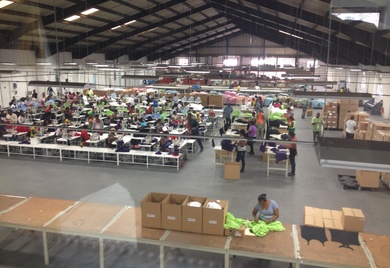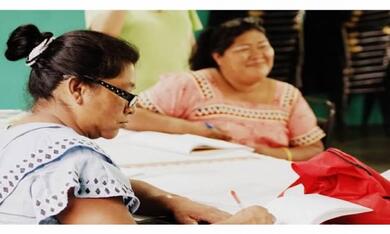Blogs Navigation
Sustainable BusinessRecent posts

Addressing gender-based violence from the private sector: the experience of Laboratorios Bagó
Francisco Méndez, CEO of the pharmaceutical company, shares his company's efforts and achievements in fostering an inclusive and safe work environment.

How Responsible Investments Can Empower Young Women and Girls in Miches While Boosting Tourism
In partnership with Fundación Tropicalia, IDB Invest fosters a more inclusive and sustainable growth path in the Dominican Republic by focusing on their untapped potential.

A Few Very Good Reasons to Protect the Integrity of Gender Bonds
Latin America and the Caribbean has become a leading region in gender bond issuance aimed at bolstering women’s empowerment. These instruments offer a promising capital market solution to mobilize funds towards projects that help accelerate parity.

Why are there so few women at the World Economic Forum?
Only 17% of participants at the World Economic Forum, hosted in Davos, Switzerland last month, were women. The annual WEF meeting brings together 2,500 leaders from government, the private sector and civil society to discuss challenges and opportunities for the global economy. For instance, one of the major outputs of the conference is a Global Risks Report that summaries economic, environmental, geopolitical, societal and technological risks to the global economy. If so few women are included in the WEF, how can the conference identify the risks that apply to the whole population and influence thinking on major world issues?

Climate change slides off CEOs’ agendas in Davos
As the World Economic Forum drew to a close last week in Davos, Switzerland, three sobering messages for sustainable business emerged from the 2,500 participants in the invitation-only event. As I followed media coverage closely, my takeaways were the following:

Is Investment in Palm Oil Certification Worth It?
Palm oil has a terrible reputation. Especially among environmental and social advocates, palm oil is viewed as the crop responsible for a large-scale deforestation, particularly in Southeast Asia. Deforestation of carbon-rich forests leads to greenhouse gas emissions; between 2001 and 2010, palm oil-driven land-use change resulted in an average of 216-268 million tons of CO2 equivalent per year in Indonesia alone. For some perspective, that’s equivalent to the emissions from driving more than 45 million cars over the course of a year! Evidence also suggests labor rights violations, including child labor, at many plantations.

Best of 2015: Quinoa: more than a healthy super-food, a super solution to food security
Two years ago, the Food and Agriculture Organization (FAO) declared 2013 the International Year of Quinoa. Before then, it was scarcely found outside of colorful Andean marketplaces except at boutique shops in the U.S. and Europe. Now, many international food companies are embracing quinoa and exporting this super-food from Andean countries like Bolivia, Peru and Ecuador.

How Haiti is becoming a leader in the quality clothing industry
By Rahul Desai, Principal Specialist, Operations Coordinator, Opportunities for the Majority at the IDB Three business leaders did what others might think is too risky and counter-intuitive. Joey Adler, the CEO of Diesel Canada and founder of the OnexOne Foundation; Richard Coles, the owner of Multiwear, one of Haiti’s leading clothing manufacturers; and Rob Broggi, a former hedge fund executive, created a company to demonstrate that Haiti is a source of higher priced, high quality apparel. This shifts away from the prevailing paradigm as being only a low-cost producer of commodity garments. In 2013 they launched Industrial Revolution II, also known as IRII, a Haiti-based garment factory that while competitive, will still invest 50% of profits into its workers and their families.

The private sector celebrates International Human Solidarity Day
December 20th marks the United Nation's International Human Solidarity Day, a day for "people from all nations, faiths, cultures and traditions to work together in common cause," according to Ban Ki-Moon. To commemorate the importance of solidarity, I wanted to share an experience that allowed my team of private sector experts to work with an indigenous community in Panama. A shared appreciation for skills-based volunteering and sustainable business facilitated the partnership.


